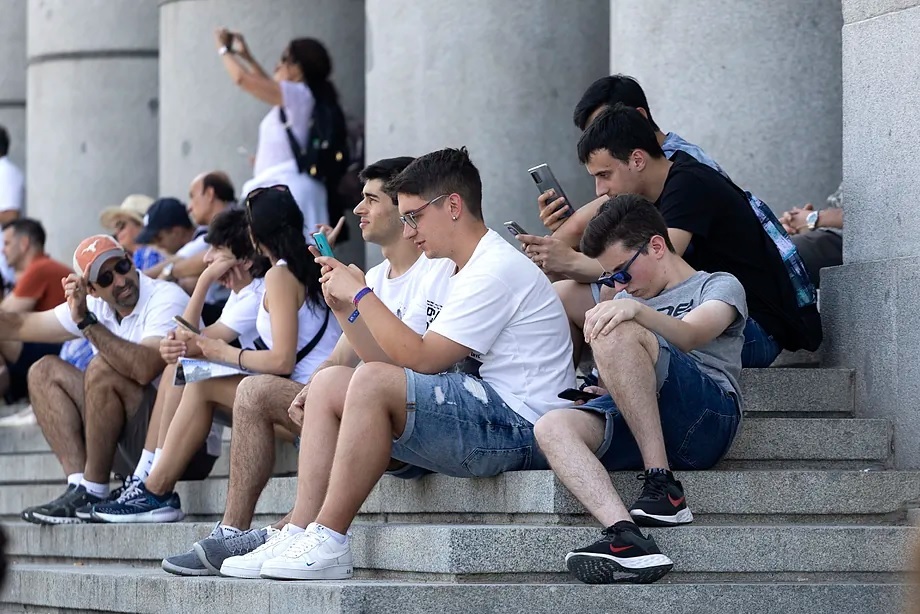The Government is concerned about the "very high degree of connectivity" to the internet among young people, especially teenagers aged 15 to 19. 70% spend four hours or more online daily, according to the latest Youth in Spain Report, accessed by EL MUNDO. The same Government that before Covid considered filling classrooms with screens as "a lever for the economic and social transformation of Spain" has now seen the writing on the wall and has reversed course. Sources from the Ministry of Youth and Childhood warn that in the digital environment, "the law of the jungle prevails, threatening the free and healthy development of young people's lives and projects."
The Institute of Youth (Injuve), under the leadership of Sira Rego (IU), today publishes a study that has been conducted since 1985 every four years to reflect new generational patterns. The most recent novelty has been the smartphone, "the central element that articulates the lives of young people," according to the report. It influences so much that it "conditions all aspects of their personal construction: work, social, and identity."
The report states that social media "are a widespread instrument for identity construction and socialization" and "bring together almost all of their references," allowing them to "build a model for themselves, which they project and reinforce in their closest relationships." What were rock stars for other generations are now influencers. Urban tribes have disappeared because identity construction is "more fluid and eclectic than in the past."
According to Injuve, this "implies both benefits and risks." Among the benefits, it mentions "educational or social advantages." Among the risks, the list is longer: "harassment and violence, addictions, exposure to closed groups and misinformation, mental health problems, or online gambling." This leads to dividing young people into two groups: those who see social media "as mere recipients and use them only for socializing, leisure, and entertainment" and those who, "as active agents, know how to use them as tools for creation, production, and social participation."
Which group is more numerous? The report does not specify, but it implies that it is the first group, as when adolescents are asked what they use screens for, 98% respond for chatting with friends, 96% for listening to music or watching series, 94% for following influencers, 92% for social media...
Almost 90% of young people connect to the internet for a minimum of two hours a day. 59% reach four hours or more. The youngest, aged 15 to 19, are the ones who spend the most time connected: 69% are online for four hours or more daily. By autonomous communities, those in Balearic Islands (72%) have a more intense consumption, followed by those in Basque Country (68%), Madrid (67%), Catalonia (64%), and Murcia (63%).
The most used social media platforms are WhatsApp (88%), Instagram (82%), TikTok (54%), YouTube (47%), Facebook (30%), and X (20%). Girls use the most popular platforms more than boys, while boys are more numerous in the minority ones. Boys also more frequently engage in online gambling (25% compared to 11% of girls), a habit that has increased from 16% to 18% since the last study in 2019.
Increase in dating app usage
The use of dating apps or websites has also increased by 10% during this time, with an average usage of 25%, although among boys it reaches up to 30%.
On March 25, the Council of Ministers sent its Anti-Screen Law to the Congress, which will require devices to include default parental controls, as well as labels explaining "the dangers and potential risks" of inappropriate use of these products and "their effects on the physical, mental, and moral development" of minors.
Sources from the Ministry consider it "essential" to regulate digital environments because they say that in these environments, "the law of the jungle prevails, threatening the free and healthy development of young people's lives and projects." With this law, they argue, the internet "will no longer be subject to the economic interests of billionaires like Elon Musk" and will be a "safer" place for children and adolescents.
At the same time, Sira Rego's team believes that it is "increasingly necessary" to offer "creative" leisure spaces as an alternative. The most common and frequent activities of young people are spending time on the internet (78% every day), listening to music (71%), watching TV (47.8%), watching movies, sports, or series on platforms (34%), going out with friends (57% do so between one and two times a week), and doing sports or walking (23%).
The report warns that, "with higher educational capital," there is less screen time and more outdoor activities such as visiting cinemas, museums, reading books, volunteering, participating in popular festivals... "This trend could lead to the risk of more disadvantaged youth being marginalized," it warns.
